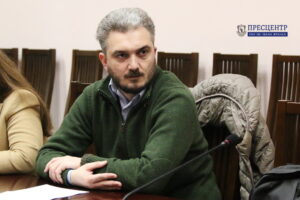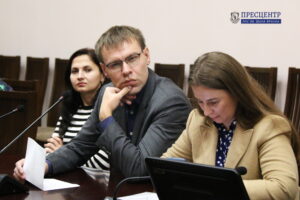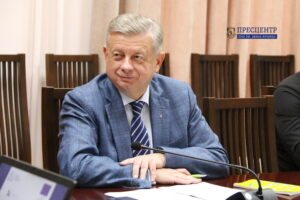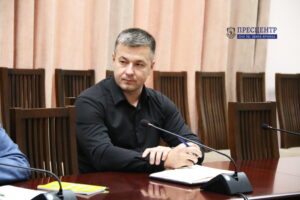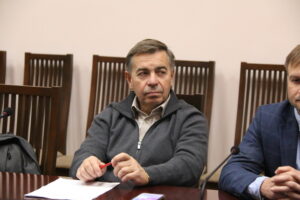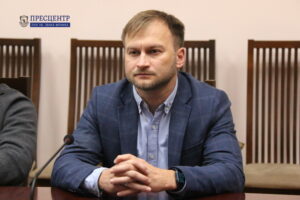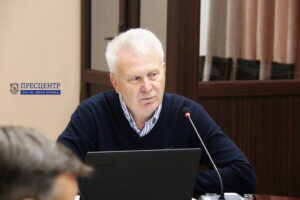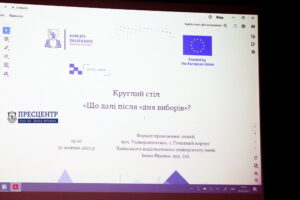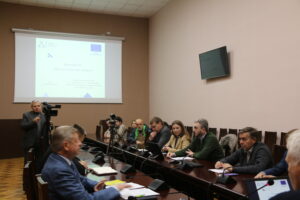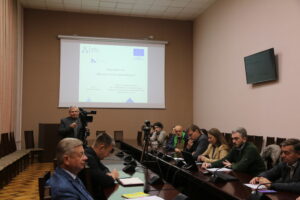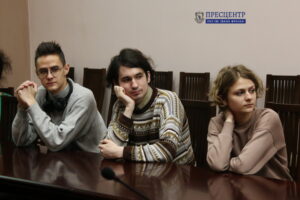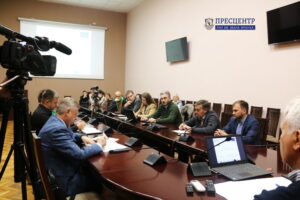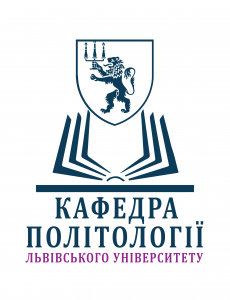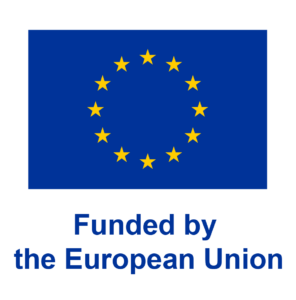On October 30, 2023, at the initiative of the Department of Political Science and the Center for Political Studies, a roundtable discussion was held titled “What’s Next After Election Day?”. Here is a brief summary of the main points raised by the speakers.
Scheduled parliamentary elections to the Verkhovna Rada of Ukraine were supposed to take place on October 29, 2023. However, due to the full-scale war initiated by Russia against Ukraine on February 24, 2022, and in accordance with the norms of the Ukrainian Constitution, parliamentary elections were not held. Nevertheless, this fact sparked powerful discussions among politicians, journalists, and Ukrainian citizens, as well as beyond Ukraine’s borders. The mere fact that the elections did not take place not only failed to resolve the issue but also added a significant number of additional challenges and questions.
Discussions regarding the feasibility or necessity of holding elections during a state of war and the challenges Ukraine faces in organizing its first post-war elections have been ongoing since at least the summer of 2023. Despite what seems to be obvious arguments from experts about the impossibility of holding elections during a war, there are also those who believe that elections are necessary to preserve democracy in Ukraine. This issue has gained such public attention that the Civic Network “OPORA” prepared a statement on the impossibility of holding elections during a war, signed by over 100 civil organizations in Ukraine. Moreover, Ukrainians themselves do not support the idea of elections at this time, as 81% of surveyed Ukrainians are against elections during wartime. The position of the international community on this matter could be a separate category, but it was not the focus of this roundtable.
The fact that elections did not take place does not mean that preparations for them should be neglected. Even in peacetime, the electoral process in Ukraine required significant adjustments and efforts from all its participants. The Central Election Commission and active relevant organizations (such as the Civic Network “OPORA,” the International Foundation for Electoral Systems, Electoral Projects of the Council of Europe in Ukraine, etc.) are preparing for the first post-war elections and also argue why conducting elections during a state of war is impossible.
The fact that elections did not take place not only failed to resolve the problem but also added a significant number of additional challenges and questions. Among them:
- Will the scheduled presidential elections also not be held in the last week of March 2024?
- Can a country be considered democratic if it does not conduct elections in wartime conditions?
- Does the government of Ukraine, which did not undergo scheduled re-election even in wartime conditions, remain legitimate, and does its legitimacy not diminish?
- When should elections be held that were not conducted due to and during a war?
- What changes need to be planned in accordance with the realities post-war?
Of course, there are many more questions, all of which are non-rhetorical, and most of them are capable of provoking significant political consequences for Ukrainian citizens and Ukraine itself. The rationale for holding the roundtable and discussing these specific and related issues in an academic environment was precisely to take into account the experiences of democratic countries in Europe and around the world. Scholars, election experts, participants in the electoral process, and other interested parties were invited to participate in the roundtable discussion.
The roundtable began with a presentation by Taras Radia, the Projects Manager in the field of elections and local self-government at the Civil Network “OPORA” in Lviv. The expert highlighted that the decision to conduct or postpone elections primarily depends on the definition of circumstances through which decisions regarding the electoral process are made. Within the public sphere, the debate is quite lively, and, to the disappointment of experts, legal principles of the current regime are not taken into account in the context of discussions.
Thus, the determination of a state of war may not necessarily be an obstacle to holding elections, but the legal regime of martial law restricts democratic principles, leading to the impossibility of ensuring the legality and oversight of elections. The expert emphasized the need to consider the legal foundations of the regime in force during a specific period and pointed out that the lack of attention to these legal principles in public discourse can lead to a misunderstanding of the complexities surrounding the decision-making process regarding elections.
Another key point raised by Mr. Taras was the lack of a unified vision regarding the practice of selecting various institutions. While there is consideration of the perspective of holding presidential elections during a state of war, there is still no relevant and well-established mechanism for implementing changes in the composition of the legislative body at the national level. Therefore, even now, before the end of the war and the lifting of the state of war, expert groups must develop methodologies and present professional recommendations for the correctness of the electoral process and ensuring the rights and freedoms of all categories of the population (both voters and candidates). By the way, this is the third important factor highlighted by the speaker: “The decision of the Venice Commission emphasizes that elections require a free political atmosphere.” Can one speak of “free will” when a state defends its sovereignty and democratic future with weapons, and when the resistance to the aggressor’s military advances comes at the cost of lives? The answer to this question is evident.
In summary, Taras Radia’s opinion was that elections for any institution are not timely at the moment. Attempting to reconstruct the approaches to their conduct would be purely formalistic actions that would not in any way fall under constitutional norms. Post-war elections should become an entirely new procedure.
Professor Vitaliy Lytvyn, the head of research programs at the Center for Political Studies, discussed the experiences of conducting wartime and post-war elections in other countries during the roundtable. He presented the results of an analysis of states often referred to when justifying electoral processes during wartime. The concept of “post-stabilization electoral procedures” after the situation in the country has stabilized and there is no threat to popular representation—the primary subject of political will—was highlighted. The case of Finland was examined, where elections during the war in 1940 and 1943 were conducted by the electoral college formed in 1937 (in this country, the head of state was not elected directly). This ensured all guarantees of the democratic nature of elections, and the state did not incur unnecessary financial resources and time on organizational processes, while the principles of security during elections were not violated.
Israel was mentioned as a conflicting state in distinguishing between elections and war. However, as Vitaliy Lytvyn explained, in Israel, most military conflicts are short-term, which is inherent to the historical preconditions of the existence of this state. Therefore, in conditions of uncertainty, elections must be held regardless of the overall state of the country. Once again, attention was focused on the constitutional regulation of the feasibility of the electoral process. As noted during the analysis and presentation, elections were held in Ireland during the war, but with a nuance: a state of war was not declared, and instead, a nationwide state of emergency with distinct legal principles was introduced.
One of the key issues in the discussions regarding holding elections in Ukraine during wartime is the legal justification for the possibility or impossibility of organizing the electoral process. This was addressed by Petro Stetsyuk, a former judge of the Constitutional Court of Ukraine (August 4, 2006, to July 5, 2016) and an analyst at the Razumkov Center, who spoke from a more legal perspective on the clarity of the electoral process.
The speaker specifically referred to the Law of Ukraine “On the Legal Regime of Martial Law,” Article 19 of which clearly states that during a state of war, the holding of elections for the President of Ukraine and the elections to the Verkhovna Rada of Ukraine, the Verkhovna Rada of the Autonomous Republic of Crimea, and local self-government bodies is prohibited. Therefore, the speaker emphasized that this is not about constitutional limitations but a direct and complete prohibition by the force of law on the electoral process under current conditions.
Petro Stetsyuk also pointed out that Article 71 of Chapter III of the Constitution of Ukraine guarantees voters the right to free expression of will. The logical question arises: can those residing in temporarily occupied territories be considered voters, as it is impossible to control the honest expression of will for such citizens? The issue of those who stay abroad for more than 40 days was also brought up, as they would not have the right to be elected. Therefore, the legal regulation must be taken into account primarily when making decisions about elections, the speaker emphasized.
During the ongoing discussion, various opinions were expressed about the current state of the electoral system, party capabilities, public sentiments, and more. Rostyslav Koval, the head of the Political Council of the Ukrainian Galician Party, focused on social fears from the perspective of the current government: “Talks about elections are a way to prolong power because it reinforces the understanding of the inevitability of responsibility for a series of events, for example, the Chonhar Bridge. And elections during the war strengthen the legitimization of power.”
Continuing the discussion on obstacles and difficulties in holding elections, Oleksandra Cholovska, an expert in elections and electoral law, an analyst at the Center for Political Studies, and a project manager at the NGO “Lviv Regulatory Hub,” emphasized the importance of the election administration system and the number of individuals involved, particularly in forming election commissions. The expert expressed doubts about the ability of parties to ensure the necessary number of commission members since they are formed on a quota basis. For example, in the last presidential elections, over 450,000 people were involved in the precinct election commissions. In the conditions of war, due to the displacement of citizens within the country and abroad, as well as mobilization, many problems with the number of people will arise, not to mention their expertise. Another aspect highlighted by Oleksandra Cholovska is the need to continue (or complete) electoral reform. While it may seem challenging to discuss electoral reform during wartime, especially when more urgent needs are apparent, it was emphasized that preparation and work should continue.
Taras Stetskiv, a Ukrainian politician and a member of the Ukrainian Parliament for the I-IV and VI convocations, agreed with the previous speakers regarding the perspective on holding elections, emphasizing the role of the President’s Office. He echoed the sentiments of the Chairman of the Verkhovna Rada about supporting factors in the electoral process during wartime. Stetskiv also highlighted that even after the end of the state of war, there would be a need for a minimum of 6 months of a transitional period to prepare for post-war elections. However, the most attention was given to the notion that elections during a war pose a significant danger to national security and unity in Ukraine.
Мykola Shchur, the deputy mayor of Horodok and the head of the regional election commission from 2010 to 2020, noted that the prolonged war affects the support for the current government. The impossibility of conducting the electoral process in the frontline towns and villages of Ukraine was also emphasized. Additionally, the position of the military regarding the conduct of elections was mentioned. It was observed that since the military play a crucial role in the electoral process, they will participate in various capacities in the elections.
Anatoliy Romaniuk, a professor and head of the Department of Political Science at Ivan Franko Lviv National University, and the director of the Center for Political Studies, noted that unlike the historical experience of many states, Ukraine has not formed a government of national unity due to the extensive ideological and strategic polarization, making it nearly impossible. The professor also addressed the timing of elections following a state victory and referenced the United Kingdom’s practice of short election campaigns. Additionally, although not the main focus of the meeting, Anatoliy Romanyuk mentioned the necessity of reforming the political party institution in Ukraine, as the current legislation regarding political parties is entirely ineffective.
The main conclusion of the round table was a consensus among all participants: until the conclusion of the Russo-Ukrainian War and the deployment of the Armed Forces of Ukraine to the Ukrainian borders of 1991, the stabilization of de-occupied territories, the organization of the electoral process should not be treated as a top priority, especially considering legislative principles and the political situation.
You can view the full recording of the round table by following the link. We appreciate everyone who contributed to its organization and invite you to participate in future events hosted by the Department of Political Science and the Center for Political Studies.
The round table was organized within the framework of the “Erasmus+” program under the direction of “Jean Monnet for Higher Education” at the Department of Political Science (Jean Monnet Module “Political Institutions and Systems in Europe: Comparison and Experience for Ukraine” No. 101126702), with the support of the European Union.
Funded by the European Union. Views and opinions expressed are however those of the author(s) only and do not necessarily reflect those of the European Union. Neither the European Union nor the granting authority can be held responsible for them.
